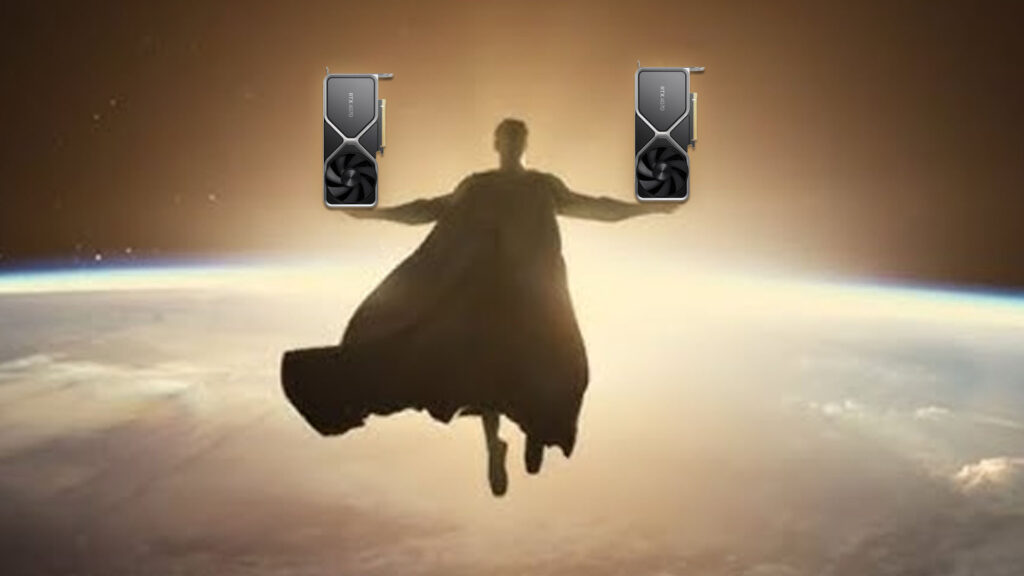
Nvidia has officially announced that it will shortly launch a new graphics card portfolio following months of speculation and leaks. The article includes a video that displays the date January 8, 2024, at 8 AM Pacific time, with a GeForce RTX Founders Edition graphics card floating over the earth’s horizon. In essence, the article reveals that Nvidia will make an announcement at CES 2024 on a new graphics card range. Fortunately for us, a lot of the important information has already been disclosed by a number of sources.
These new GPUs are obviously the much anticipated RTX 40-series Super update, which has been the subject of months of internet leaks and rumours. At least three entirely new Ada Lovelace RTX 40-series GPUs—the RTX 4070 Super, RTX 4070 Ti Super, and RTX 4080 Super—are anticipated to be included in Nvidia’s next upgrade.
While the RTX 4070 Ti Super is anticipated to arrive with a core count rise and a significant memory improvement compared to the previous 4070 Ti, the RTX 4070 Super and RTX 4080 Super are anticipated to have a notable spec bump in CUDA cores over their vanilla counterparts.
According to reports, the RTX 4070 Super and RTX 4080 Super would have 7,168 and 10,240 CUDA cores, respectively, along with 24 GT/s GDDR6X memory ICs. There are rumours that the RTX 4070 Ti Super has 8,448 CUDA cores, 16GB of RAM, a 256-bit bus, and 22.4 GT/s GDDR6X memory chips.
Naturally, it’s important to remember that these are only rumours. On January 8, Nvidia is expected to clarify all the information, and there could be some changes from what we’ve heard previously.
| Header Cell – Column 0 | GPU | FP32 CUDA Cores | Memory Configuration | L2 Cache | TBP | MSRP |
|---|---|---|---|---|---|---|
| *GeForce RTX 4090 Ti | AD102 | 18176 (?) | 24GB 384-bit 24 GT/s GDDR6X (?) | 96 MB (?) | 600W (?) | Arm+Leg |
| GeForce RTX 4090 | AD102 | 16384 | 24GB 384-bit 21 GT/s GDDR6X | 72 MB | 450W | $1,599 |
| *GeForce RTX 4080 Super | AD103 | 10240 | 16GB 256-bit 24 GT/s GDDR6X | 64 MB | 320W | $999–$1,099 |
| GeForce RTX 4080 | AD103 | 9728 | 16GB 256-bit 22.4 GT/s GDDR6X | 64 MB | 320W | $1,199 |
| *GeForce RTX 4070 Ti Super | AD103-275/AD102-175 | 8448 | 16GB 256-bit 22.4 GT/s GDDR6X | 48 MB | 285W | $799–$849 |
| GeForce RTX 4070 Ti | AD104 | 7680 | 12GB 192-bit 21 GT/s GDDR6X | 48 MB | 285W | $799 |
| *GeForce RTX 4070 Super | AD104-350/AD103-175 | 7168 | 12GB 192-bit 21 GT/s GDDR6X | 48 MB | 225W | $599–$649 |
| GeForce RTX 4070 | AD104 | 5888 | 12GB 192-bit 21 GT/s GDDR6X | 36 MB | 200W | $599 |
| GeForce RTX 4060 Ti | AD106 | 4352 | 8GB/16GB 128-bit 18 GT/s GDDR6 | 32 MB | 160W | $399/$499 |
| GeForce RTX 4060 | AD106 | 3072 | 8GB 128-bit 17 GT/s GDDR6 | 24 MB | 115W | $299 |
Although it seems unlikely, there are rumours that Nvidia would introduce the RTX 4090 Ti/Titan Ada, which was allegedly scrapped, as its fourth GPU as part of the next 40-series Super update. More for entertainment value, we’ve kept it in the table above.
Similar to the RTX 20-series Super refresh, the RTX 40-series Super refresh is anticipated to revitalise the series by offering new GPU combinations at more affordable prices when compared to the series’ departing SKUs. The RTX 40-series received a lot of bad press upon release because of its extremely expensive GPUs and often insufficient performance gains. It was not helped by the somewhat shorter interface widths and VRAM designs.
This was especially noticeable in the case of the RTX 4080 and RTX 4060 Ti, which at launch provided remarkably low performance per dollar. Attempting to pass off the RTX 4060 Ti 16GB as a solution for the memory configurations proved to be unsuccessful. Without a doubt, this had a role in Nvidia’s initial decision to approve mid-cycle update.
While there’s no certainty that the RTX 40-series Super update will completely resolve the pricing concerns with the existing portfolio, it should at least introduce some competitive GPUs to the market. In any case, we will quickly see how competitive Nvidia’s RTX 40-series Super GPUs will be because all three cards are scheduled to release this month, spaced one week apart.
